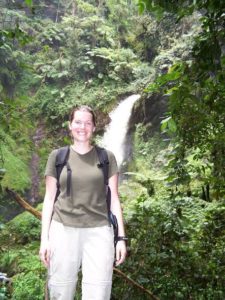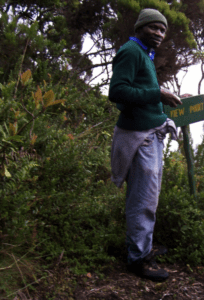Student Involvement
Below is a list of the graduate students who have worked with Prof Beth Kaplin in Nyungwe forest on research projects. Some of the students are from the Environmental Studies Dept at Antioch University New England and are students of CTEC, others are from University of Rwanda, and others are from different universities and have collaborated with Prof Kaplin in the research projects.
Julie Krajewski
University of Wisconsin MS graduate 2007, Conservation Biology
Julie conducted research in Cyamudongo forest fragment isolated but part of Nyungwe National Park while under the mentorship of CTEC’s founder, Beth Kaplin. Julie was enrolled as a graduate student at University of Wisconsin-Madison when she completed the research for her master’s thesis. She collected data on human-chimpanzee encounters to help assess the effects of tourism on the chimpanzee community in this forest fragment. From the data she was able to provide management recommendations to park management and baseline information that can be compared with future data as chimpanzee tourism progresses at that site.

Nicole Gross-Camp
Antioch University New England, Environmental Studies PhD graduate 2009
Nicole first travelled to Nyungwe as a Master’s student at AUNE working with Beth Kaplin to study chimpanzee seed dispersal ecology. She then returned for her doctoral research to continue studies of primate seed dispersal in the forest. More recently she returned to Nyungwe as a senior researcher at Overseas Development Group, University of East Anglia studying payments for ecosystem services in Nyungwe National Park.
Sylvia Kawera
National University of Rwanda BA graduate 2012
Biology While completing her bachelors degree Sylvia conducted research under the supervision of Prof Kaplin to better understand the effects forest buffer zones have on the abundance and diversity of dung beetles within ANTIOCH.EDU/NEW-ENGLAND Nyungwe National Park. She later participated on a ten month research project focused on the conservation of chimpanzee habitat within the park headed by Prof Kaplin. Sylvia is currently working at the Center for Excellence for Biodiversity in Rwanda and hoping to begin a master degree soon.
Rachel McShane
Antioch University New England MS ‘08, Conservation Biology
While a Master’s student, Rachel conducted her research in Cyamudongo, a small forest fragment near Nyungwe. Her project focused on assessing the severity of wildlife crop-raiding from the perspective of the farmers living near the protected forest fragment. Through interviewing 215 families Rachel concluded that the baboons were the most damaging culprits and she hopes this information will lead to a greater understanding between farmers and park conservationists.

Robin Martino
Antioch University New England PhD candidate, Environmental
Studies Robin is a current PhD candidate in the Environmental Studies Dept, and is conducting research in Nyungwe National Park’s buffer zones. Her research looks at how different land uses in the buffer zone influences seed dispersal of large seeded trees. Results from this research will contribute to the development of a holistic protected buffer zone management approach that considers the ecological integrity of the protected area in addition to economic benefits of land use in the surrounding matrix. In addition to her research Robin has also been involved with the University of Rwanda since April 2008 by serving as a guest lecturer and interacting with undergraduate students within the biology department. In 2012 she helped set up a field team and field work logistics for data collection on chimpanzee forest use for a U.S. Fish and Wildlife Service Great Ape Conservation Fund Grant.
Katelynn Frei
Antioch University New England MS candidate, Conservation Biology
Katelynn is a current Master’s candidate studying conservation biology and is conducting a research project in Nyungwe National Park during her spring 2014 semester. She is using a unique, new method to assess diversity, distribution, and density of nocturnal primates, infrared cameras, which may facilitate studies of these cryptic and hard to observe species. The purpose of her study is to document the frequency of occurrence of nocturnal primates for the first time in montane tropical forest of Nyungwe. A total of 10 remote infrared camera traps will be set up along contour lines ranging from 1800-2600m in elevation and spaced approximately 200 meters apart. CTEC is excited to see Katleynn begin her project, and encourages everyone to stay tuned as she analyses her research results.
McArd Joseph Mlotha
Antioch University New England PhD candidate, Environmental Studies
Joseph is currently serving as CTEC’s program manager while completing his PhD in environmental studies. In 2008 Joseph traveled to Nyungwe National Park to do his service learning project which was focused on the historical, spatial, and temporal distribution of fire within the park based on the available information. He also worked to identify potential research questions for future fire related investigation. As a result of Joseph’s research Nyungwe National Park management increased the focus on fire awareness, monitoring and prevention activities. Joseph also worked for the Center for GIS at University of Rwanda for a year, and then returned to Rwanda to conduct his PhD research on carbon biomass in Nyungwe National Park, including a mapping project of the vegetation cover of the forest.

